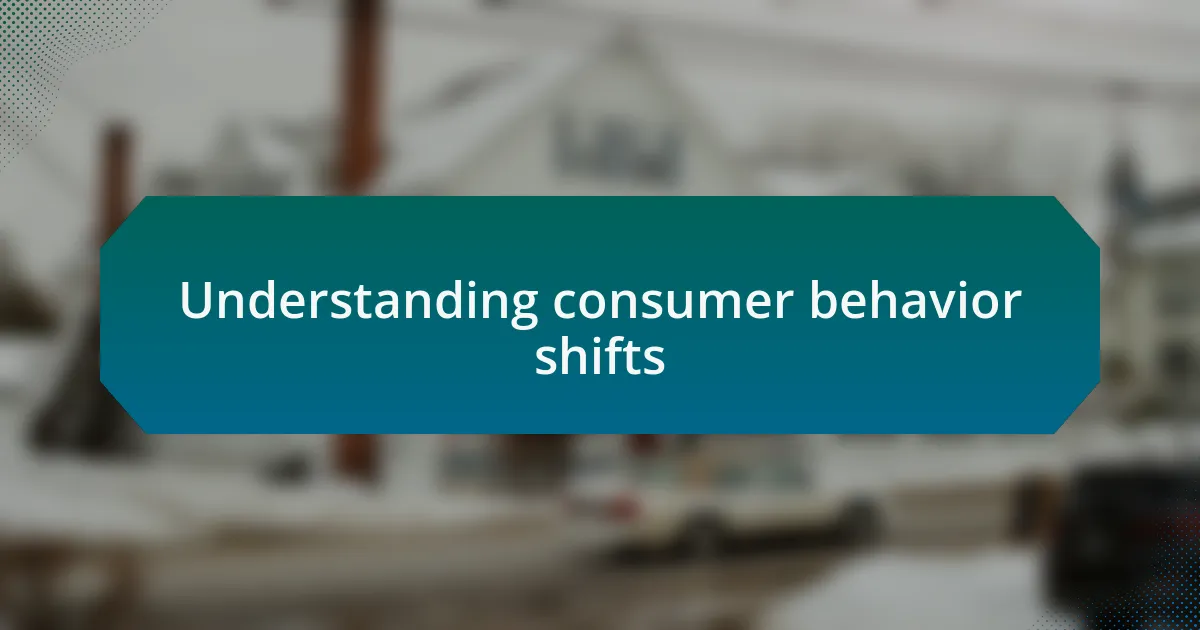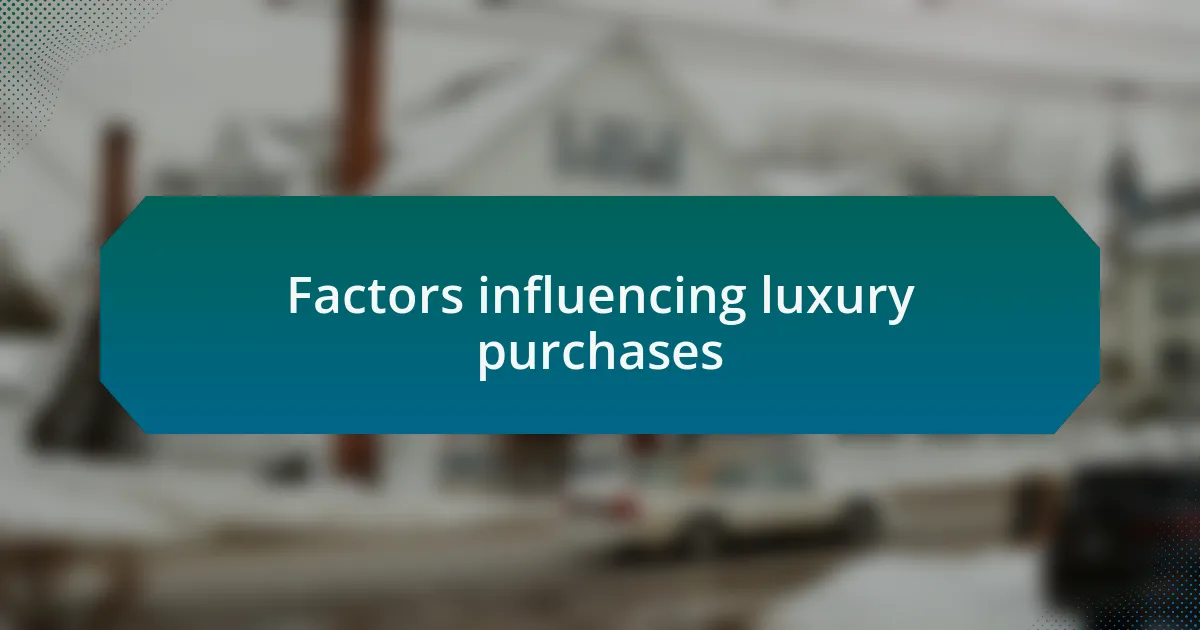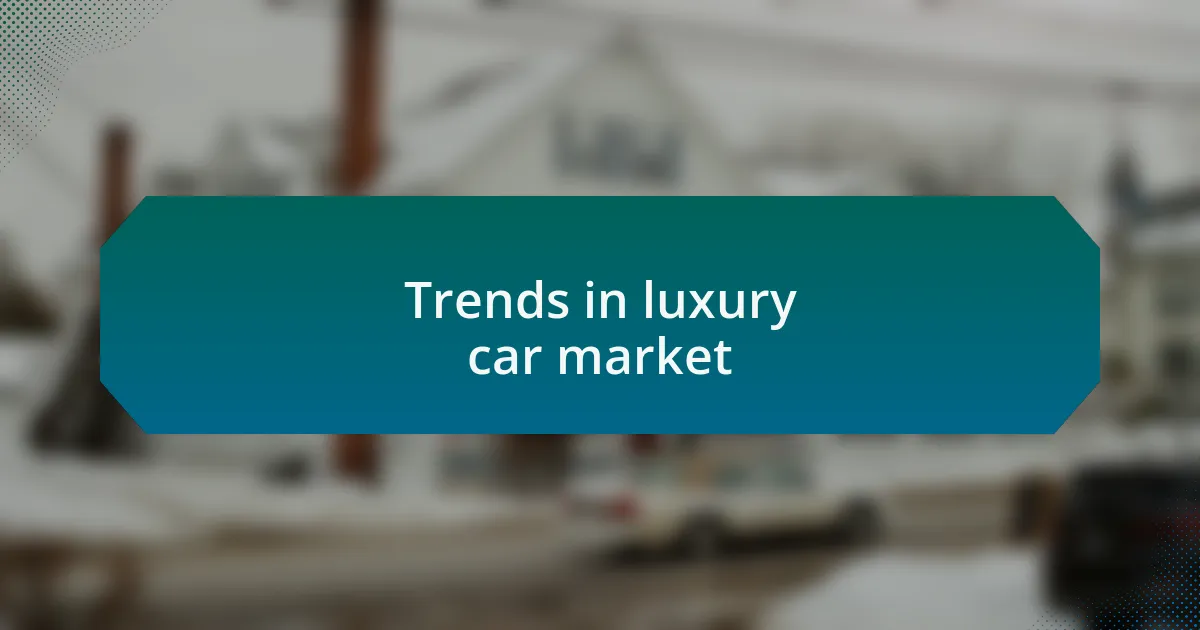Key takeaways:
- Shifts in consumer behavior highlight a growing preference for sustainability and emotional connections in luxury car purchases.
- Luxury car sales are vital for setting trends and reflecting economic health, with technology integration and personalization becoming key factors.
- There is a rising trend towards valuing experiences over mere ownership, as consumers seek cars that resonate with their identities and values.

Understanding consumer behavior shifts
Understanding consumer behavior shifts is essential in adapting to changing markets. For instance, I remember when I first noticed a growing interest in electric luxury cars. Consumers began to prioritize sustainability along with style and comfort. This shift made me wonder: how much do eco-friendly features now influence purchasing decisions?
As I engaged with potential buyers, many expressed their desire for vehicles that reflect their values, not just their affluence. This made perfect sense to me; owning a luxury car now sometimes feels like a statement of identity. The emotional connection consumers have with their vehicles has deepened, creating a fascinating landscape where each choice reflects personal beliefs and lifestyles.
I often find myself questioning the traditional markers of luxury. Is it just about the price tag, or has it evolved to encompass technology and environmental responsibility? This exploration of value highlights how consumer priorities have changed dramatically, showcasing a desire for authenticity and innovation in the luxury market.

Importance of luxury car sales
Understanding the importance of luxury car sales goes beyond the mere exchange of goods; it’s about setting trends and influencing lifestyles. I recall attending an auto show where the excitement around new luxury models was palpable. It was evident that these cars weren’t just about transportation—they were symbols of success and aspiration.
Sales in this market provide insights into consumer desires and societal shifts. For example, I’ve seen how brands that embrace cutting-edge technology and sustainability attract a more discerning clientele. Wouldn’t it be intriguing to consider how these aspects could redefine what we perceive as luxury?
Additionally, the high-value nature of luxury cars supports economies and creates jobs across various sectors, from manufacturing to service. I often think about how a thriving luxury car market can inspire innovations that trickle down into more affordable vehicles—wouldn’t that enrich the entire automotive landscape? It’s clear that luxury car sales play a pivotal role, reflecting broader economic health and consumer confidence in the market.

Factors influencing luxury purchases
When it comes to luxury purchases, brand reputation plays a crucial role. From my own experience, I’ve often chosen luxury brands not just for the vehicle but for the legacy and quality they represent. I still remember test-driving a high-end sports car and being struck by the carefully curated experience provided by the dealership—it reinforced my perception of the brand. Isn’t it fascinating how much influence a name can have on our choices?
Emotional connection also significantly influences luxury purchases. I once found myself drawn to a luxury car that reminded me of my father’s old sedan, which he cherished. This emotional tie made the decision easier, as I subconsciously associated the new car with cherished memories. Have you ever experienced a similar connection with a product? Those sentiments often guide buyers toward luxury items that resonate on a personal level.
Lastly, the growing emphasis on sustainability cannot be overlooked. Many consumers, including myself, are increasingly inclined to invest in luxury vehicles that prioritize eco-friendly technology. I recall discussing this with a friend who opted for a hybrid luxury car; he mentioned that it wasn’t just about image but also making a responsible choice for the environment. How can we ignore that luxury in today’s world often embraces a commitment to sustainability?

Trends in luxury car market
The luxury car market has seen a noticeable shift towards personalization. When I was in the market for a new vehicle, I discovered how brands are now offering customization options that cater to individual tastes and preferences. It’s intriguing to see how customers are willing to invest more when they feel their car truly reflects their unique style and personality—isn’t that just a testament to how much we value self-expression today?
Another emerging trend is the move toward technology integration. A few years back, I experienced a luxury car equipped with cutting-edge tech features. From advanced driver assistance systems to seamless connectivity with smartphones, these innovations not only enhance the driving experience but also cater to a tech-savvy audience. It raises a question: how essential is technology in our decision-making when choosing a luxury vehicle today?
Lastly, there’s a rising desire for experiences over ownership. I recall attending a luxury car event where individuals could test drive multiple high-end models, immersing themselves in the lifestyle each car represented. It made me realize that many consumers now value the experience of driving a luxury car rather than the mere ownership of one. Isn’t it fascinating how the focus has shifted from possession to enjoyment?

My insights on changing preferences
Changing preferences in luxury car sales reveal a deeper connection between consumers and their vehicles. Recently, I attended a luxury vehicle showcase where attendees passionately discussed their dream cars, focusing not just on features but on how these cars resonated with their identities. It struck me how much we now seek a vehicle that tells our story—what does your car say about you?
Additionally, I’ve noticed a shift towards sustainability in luxury purchases. During conversations with friends, several expressed concerns about environmental impact and showed a preference for brands that prioritize eco-friendly practices. This feels like a significant change; our values are driving us to align our purchases with our principles. How can luxury brands adapt to this new consciousness?
Moreover, exclusivity is evolving. In the past, owning a rare model was a status symbol. Recently, I met a collector who shared how he’s now more interested in the car’s heritage and the story behind it. Shouldn’t luxury brands be more attentive to the narratives they create around their products? Engaging consumers on this emotional level may redefine what it means to be part of the luxury car community.